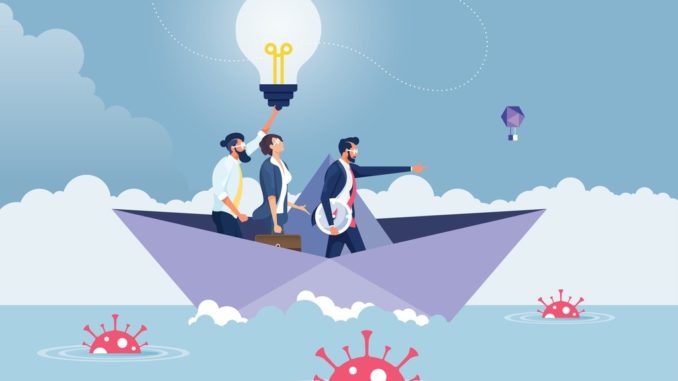
In a crisis, it’s all too easy to get caught up in the moment, close your ears to outside advice, and forget that not everyone is in the same boat
CREDIT: This is an edited version of an article that originally appeared on Management Today
Over the last few months we’ve spoken regularly to business leaders, academics and authors about how they’re coping with the pandemic, and sought their tips for helping others do so.
Here’s a selection of their insights.
Teams trump talent
“In times of crisis, surround yourself with the best people that you possibly can,” said Rene Carayol, executive coach and author of Spike: What are you great at? when we interviewed him in December 2020.
“But don’t forget the team. The old obsession of simply choosing the best person for the job can leave you with a disparate group of talented individuals – they may not gel as a team.
You’re only as strong as your team; you’re as weak as them as well.”
Dissent is good
Trust is central to leadership, but being able to bring people with you has an added importance during a public health crisis. Unfortunately, trust – and it’s ugly stepsister distrust – are concepts that businesses often fundamentally misunderstand, says Rachel Botsman, trust fellow at Oxford University’s Saïd Business School.
“We have this idea that trust and distrust are separate, existing in a different place, but they actually coexist. At senior levels you want high levels of trust so that, in those moments where you disagree – and ‘distrust’ each other, so to speak – you can actually voice your dissent.
She says that the most effective leadership teams are in a state of trust and distrust all the time. “It’s a really important dynamic to be able to trust each other enough to say ‘No, this isn’t a good idea’ or ‘We shouldn’t do this’. Trust is being able to make that call.”
There is always time to ask questions
Steffen Hoffmann, Bosch UK’s outgoing president, has spent 26 years at the firm. During that time he’s worked in four different countries and faced several economic recessions. When asked to share one of his key leadership lessons, he offered this take on making decisions under pressure.
“It is important to familiarise yourself with your business in terms of facts and figures, but you also have to trust your gut feeling. If you manage in a style where you blindly believe numbers, figures and KPIs, sooner or later, something is going to go wrong.
“If you have a bad feeling about something it’s better to think twice, look deeper and get additional opinions.”
Fairness isn’t universal (although it should be)
The COVID-19 pandemic has amplified the inequalities that already existed within society. People from ethnic minority backgrounds are three times more likely to contract the virus, and five times more likely suffer serious outcomes.
When it comes to the effects of lockdown, and working from home, they have also felt the impact more acutely. A November 2020 Mckinsey report indicates that ‘diverse’ employees – which the report counts as non-white, female and LGBTQ+ people – are more likely say they face ‘significant challenges’ as a result of the pandemic; anxieties around career progression and prospects are a particular concern for black, Asian and minority ethnic people.
During November’s CIPD Annual Conference Reni Eddo-Lodge, author of Why I’m No Longer Talking To White People About Race, and June Sarpong, the BBC’s director of creative diversity, discussed institutional racism, representation and finding personal validation.
When asked by an attendee to suggest one key takeaway for leaders to take forward, Rene focused on the fact that change cannot happen if individual firms don’t know what their employees are experiencing.
“Ask yourself, ‘How is the way that we are organised disadvantaging people?’ Do an audit and if you find out that it is [disadvantaging people], work out how to remedy that.”
However, June pointed out that there is a flip side to this. “Also look at whether it is giving some people an unfair advantage. Looking at who is advantaged allows you also to know what to do for those who aren’t progressing at the same rates. You see what’s working, now let’s do more of that for everybody else.”
Out of sight can mean out of mind
“Whatever tensions there are within an organisation are exacerbated by remote working,” said Krish Raval, a management coach and founder of Faith In Leadership, when talking about the importance of goal-setting, employee feedback and maintaining a sense of purpose during times of uncertainty.
“What’s particular about these times is that people can focus on the tasks and forget why they work. One of the symptoms of an organisation that is about to die is everyone thinks about themselves, and are trapped by their own neurosis and individual needs and desires. It’s not really about the mission or the purpose.
“Remote working – if it is not managed well – can lead to a similar ‘me-ness’, where the whole organisation acts as if its purpose is not to do the task, but to serve the individual purposes of its employees. If all employees are like this it is chaos. Unless you have a centripetal force that brings people together there is a risk of this happening.”
Over-engaging can lead to fatigue, but by showing care, taking every opportunity to relate beyond formal feedback reviews and reminding employees of goals, leaders can mitigate the problem, added Krish.


Be the first to comment